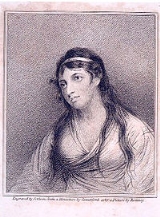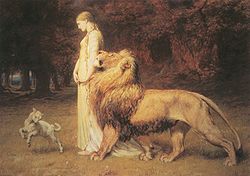
Mary Tighe
Encyclopedia
Mary Tighe (October 9, 1772 – March 24, 1810), was an Anglo-Irish poet
.
She was born in Dublin to Theodosia Tighe, a Methodist leader, and William Blachford (d.1773?), a Church of Ireland
clergyman and librarian. She had a strict religious upbringing, and when she was twenty-one she married Henry Tighe (1768–1836), her first cousin and a member of the Parliament of Ireland
for Inistioge
, County Kilkenny
. The marriage is said to have been unhappy, though little is known.
The couple moved to London
in the early nineteenth century. Tighe became acquainted with Thomas Moore
, an early admirer of her writing, and others interested in literature. Although she had written since girlhood, she published nothing until Psyche (1805), a six-canto allegorical poem in Spenserian
stanzas. Psyche was admired by many and praised by Thomas Moore in his poem, 'To Mrs. Henry Tighe on reading her Psyche'.
Having suffered for at least a year, Mary Tighe endured a serious attack of tuberculosis
in 1805.In February of 1805 Thomas Moore states that she had 'a very serious struggle for life' and in August of the same year that she was 'ordered to the Madeiras'. Moore also claimed that 'another winter will inevitably be her death.' Tighe lived for another five years and spent her last few months of life as an invalid at her brother-in-law's estate in Woodstock,co. Wicklow, Ireland. She was buried in Initioge church, co. Kilkenny. Her diary was destroyed, though a cousin copied out excerpts.
The year following her death a new edition of Psyche was released, along with some previously unpublished poems; it was this edition that established her literary reputation. John Keats
was one of her admirers and paid tribute to her in his poem, "To Some Ladies." Pam Perkins writes that "[d]espite the bleakness of many of the short poems in the 1811 volume, in much of the nineteenth-century writing on Tighe there is a tendency to make her an exemplar of patiently (and picturesquely) long-suffering femininity, a tendency exemplified most famously in Felicia Hemans
's tribute to her, 'The Grave of a Poetess.'"
Psyche, or the legend of love is Mary Tighe’s rendition of the Greco-Roman folktale of Cupid and Psyche
. The story is about a woman named Psyche who is so beautiful that the goddess Venus becomes envious of the attention that Psyche receives. Venus sends her son Cupid to Psyche in order to make her fall in love with a monster. Instead Cupid falls in love with Psyche and tries to keep it a secret but is inevitably found out by Venus who then sets Psyche various tests to complete. In the end Psyche is transformed into a goddess herself by Jupiter.
 Tighe’s version explains how Cupid falls in love with Psyche. She only makes a few changes in the details from the original. When Cupid first goes to Psyche he comes equipped with water from a bitter spring from his mother’s garden along with his arrows. "The evil done now anxious to repair, He shed in haste the balmy drops of joy O'er all the silky ringlets of her hair." She also makes allusions to Spencer’s Fairie Queene during Psyche’s final task set by Venus. "A cruel monster now her steps pursued, Well known of yore and named the Blatant Beast."
Tighe’s version explains how Cupid falls in love with Psyche. She only makes a few changes in the details from the original. When Cupid first goes to Psyche he comes equipped with water from a bitter spring from his mother’s garden along with his arrows. "The evil done now anxious to repair, He shed in haste the balmy drops of joy O'er all the silky ringlets of her hair." She also makes allusions to Spencer’s Fairie Queene during Psyche’s final task set by Venus. "A cruel monster now her steps pursued, Well known of yore and named the Blatant Beast."
Poet
A poet is a person who writes poetry. A poet's work can be literal, meaning that his work is derived from a specific event, or metaphorical, meaning that his work can take on many meanings and forms. Poets have existed since antiquity, in nearly all languages, and have produced works that vary...
.
She was born in Dublin to Theodosia Tighe, a Methodist leader, and William Blachford (d.1773?), a Church of Ireland
Church of Ireland
The Church of Ireland is an autonomous province of the Anglican Communion. The church operates in all parts of Ireland and is the second largest religious body on the island after the Roman Catholic Church...
clergyman and librarian. She had a strict religious upbringing, and when she was twenty-one she married Henry Tighe (1768–1836), her first cousin and a member of the Parliament of Ireland
Parliament of Ireland
The Parliament of Ireland was a legislature that existed in Dublin from 1297 until 1800. In its early mediaeval period during the Lordship of Ireland it consisted of either two or three chambers: the House of Commons, elected by a very restricted suffrage, the House of Lords in which the lords...
for Inistioge
Inistioge
Inistioge is a small scenic village in County Kilkenny, Ireland. It is situated on the River Nore, southeast of Kilkenny. Historically, the name has been spelt as Ennistioge, Ennisteage, and in other ways....
, County Kilkenny
County Kilkenny
County Kilkenny is a county in Ireland. It is part of the South-East Region and is also located in the province of Leinster. It is named after the city of Kilkenny. The territory of the county was the core part of the ancient Irish Kingdom of Osraige which in turn was the core of the Diocese of...
. The marriage is said to have been unhappy, though little is known.
The couple moved to London
London
London is the capital city of :England and the :United Kingdom, the largest metropolitan area in the United Kingdom, and the largest urban zone in the European Union by most measures. Located on the River Thames, London has been a major settlement for two millennia, its history going back to its...
in the early nineteenth century. Tighe became acquainted with Thomas Moore
Thomas Moore
Thomas Moore was an Irish poet, singer, songwriter, and entertainer, now best remembered for the lyrics of The Minstrel Boy and The Last Rose of Summer. He was responsible, with John Murray, for burning Lord Byron's memoirs after his death...
, an early admirer of her writing, and others interested in literature. Although she had written since girlhood, she published nothing until Psyche (1805), a six-canto allegorical poem in Spenserian
Edmund Spenser
Edmund Spenser was an English poet best known for The Faerie Queene, an epic poem and fantastical allegory celebrating the Tudor dynasty and Elizabeth I. He is recognised as one of the premier craftsmen of Modern English verse in its infancy, and one of the greatest poets in the English...
stanzas. Psyche was admired by many and praised by Thomas Moore in his poem, 'To Mrs. Henry Tighe on reading her Psyche'.
Having suffered for at least a year, Mary Tighe endured a serious attack of tuberculosis
Tuberculosis
Tuberculosis, MTB, or TB is a common, and in many cases lethal, infectious disease caused by various strains of mycobacteria, usually Mycobacterium tuberculosis. Tuberculosis usually attacks the lungs but can also affect other parts of the body...
in 1805.In February of 1805 Thomas Moore states that she had 'a very serious struggle for life' and in August of the same year that she was 'ordered to the Madeiras'. Moore also claimed that 'another winter will inevitably be her death.' Tighe lived for another five years and spent her last few months of life as an invalid at her brother-in-law's estate in Woodstock,co. Wicklow, Ireland. She was buried in Initioge church, co. Kilkenny. Her diary was destroyed, though a cousin copied out excerpts.
The year following her death a new edition of Psyche was released, along with some previously unpublished poems; it was this edition that established her literary reputation. John Keats
John Keats
John Keats was an English Romantic poet. Along with Lord Byron and Percy Bysshe Shelley, he was one of the key figures in the second generation of the Romantic movement, despite the fact that his work had been in publication for only four years before his death.Although his poems were not...
was one of her admirers and paid tribute to her in his poem, "To Some Ladies." Pam Perkins writes that "[d]espite the bleakness of many of the short poems in the 1811 volume, in much of the nineteenth-century writing on Tighe there is a tendency to make her an exemplar of patiently (and picturesquely) long-suffering femininity, a tendency exemplified most famously in Felicia Hemans
Felicia Hemans
-Ancestry:Felicia Heman's paternal grandfather was George Browne of Passage, co. Cork, Ireland; her maternal grandparents were Elizabeth Haydock Wagner of Lancashire and Benedict Paul Wagner , wine importer at 9 Wolstenholme Square, Liverpool. Family legend gave the Wagners a Venetian origin;...
's tribute to her, 'The Grave of a Poetess.'"
Works
- Psyche, or the Legend of Love (Privately printed, 50 copies, 1805; republished posthumously in 1811 with other, previously unpublished works by Longman, London) Etext of Psyche from the 1811 ed.]
Psyche, or the legend of love is Mary Tighe’s rendition of the Greco-Roman folktale of Cupid and Psyche
Cupid and Psyche
Cupid and Psyche , is a legend that first appeared as a digressionary story told by an old woman in Lucius Apuleius' novel, The Golden Ass, written in the 2nd century CE. Apuleius likely used an earlier tale as the basis for his story, modifying it to suit the thematic needs of his novel.It has...
. The story is about a woman named Psyche who is so beautiful that the goddess Venus becomes envious of the attention that Psyche receives. Venus sends her son Cupid to Psyche in order to make her fall in love with a monster. Instead Cupid falls in love with Psyche and tries to keep it a secret but is inevitably found out by Venus who then sets Psyche various tests to complete. In the end Psyche is transformed into a goddess herself by Jupiter.


- Selena (unpublished novel; MS in the National Library of Ireland)
- Mary: a Series of Reflections during 20 Years (Posthumous; edited and privately printed by her brother-in-law, William Tighe, 1811)
Resources
- Blain, Virginia, et al., eds. "Tighe, Mary." The Feminist Companion to Literature in English. New Haven and London: Yale UP, 1990. 1081.
- Perkins, Pam. “Tighe , Mary (1772–1810).” Oxford Dictionary of National Biography. Ed. H. C. G. Matthew and Brian Harrison. Oxford: OUP, 2004. 14 Apr. 2007.

